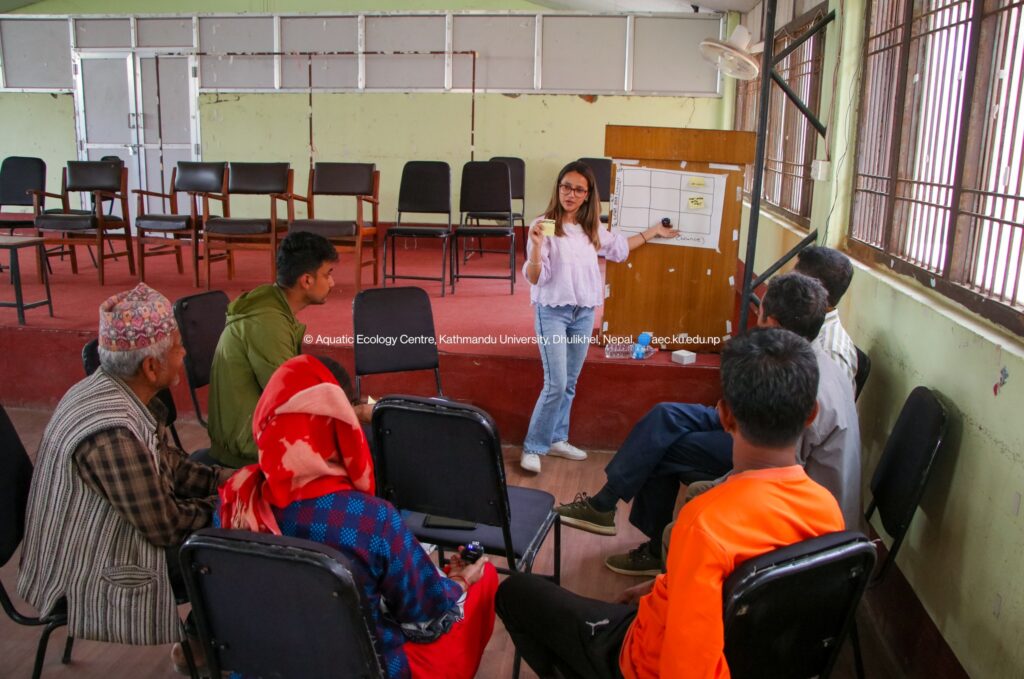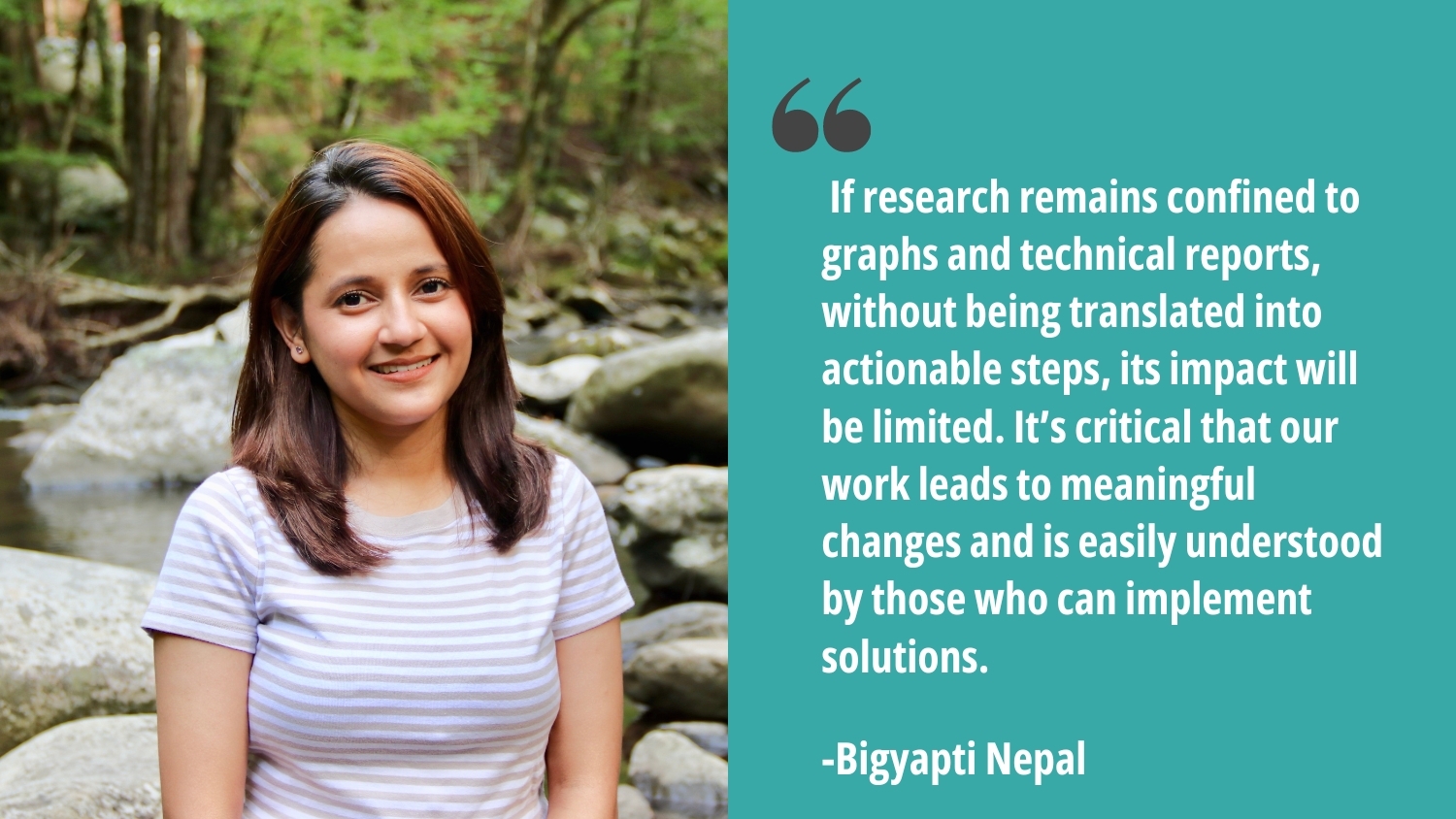2024-25 Global Change Research Fellow
PhD Student, Center for Geospatial Analytics at North Carolina State University
Advisor: Dr. Daniel Obenour
About You
What do you study?
My research focuses on the presence of harmful algal blooms (HABs) in water systems, with a specific emphasis on predicting the occurrence of cyanotoxins, toxins produced by certain algae. Using a flexible Bayesian Network (BN) model, I integrate environmental data to improve predictions of HABs and associated toxin production. In addition, my work contributes to the development of predictive tools and risk mapping products in collaboration with stakeholders. The goal is to provide iterative guidance that enhances our ability to monitor and manage the impacts of harmful algal blooms in marine environments.
What (or who) influenced you to go into this field of study?
I did not take a traditional path when choosing a career in environmental science—it was somewhat coincidental, but looking back, it has been incredibly rewarding. Growing up in Nepal, surrounded by diverse ecosystems and freshwater systems, I always had a keen interest in nature and a desire to contribute to preserving water quality. My undergraduate studies exposed me to how technology could play a crucial role in improving water management, which sparked my curiosity further. I was also deeply motivated by the potential for my research to directly benefit people. A project during my undergraduate studies, along with my work as a research assistant for the South Asian Nitrogen Hub at Kathmandu University, played a pivotal role in fueling my passion for environmental science and driving me toward this field. These experiences helped shape my career and reinforced my commitment to using science to address critical environmental challenges.
What do you think is the most pressing issue related to global change?
The most pressing issue related to global change is climate change and, more importantly, our ability to adapt to it. Climate change is a complex, multifaceted problem, driven by a series of interconnected factors. This complexity is mirrored in my own field of research on harmful algal blooms, which are often caused by excess nutrient loading in water bodies, rising water temperatures, and other environmental stressors linked to climate change. However, beyond understanding these issues, the real challenge lies in how we adapt and implement solutions. As a researcher, I often reflect on the importance of making our findings accessible and communicable to the broader public. If research remains confined to graphs and technical reports, without being translated into actionable steps, its impact will be limited. It’s critical that our work leads to meaningful changes and is easily understood by those who can implement solutions.
About Your Research

What results are you finding?
While my research is still in its early stages, I have found that cyanotoxins produced by harmful algal blooms are not adequately addressed and can have severe effects on entire ecosystems, as well as human health, particularly through the consumption of contaminated seafood. These toxins can lead to a range of serious, even lethal, health issues. Although I am still in the process of gathering more data, I am confident that my findings will contribute to a better understanding of the impacts of cyanotoxins on human health and help inform mitigation strategies for managing these risks in the future.
Who will benefit from your research?
I hope that my research will primarily benefit policymakers by providing them with the necessary information to prioritize the monitoring and management of harmful algal blooms (HABs) and their associated health risks. The connection between HABs and human health, particularly through exposure to contaminated seafood and water, is often overlooked, and my findings could help inform policies aimed at better addressing these risks. Additionally, communities that are at high risk of exposure to areas affected by HABs may also benefit from improved monitoring and management strategies, helping to reduce their vulnerability to harmful toxins.
How would you describe your research to a 3rd grader?
In the ocean, there are tiny plants called algae. Some of them are good, but some are not so good and can make harmful substances. These substances can hurt sea animals and even make people sick if they drink the bad water. I study where these harmful substances are found and how we can stop them. I want to help keep the ocean and our water clean and healthy so we can all be healthy, too!
About Your Global Change Research Fellow Experience
How do you expect the SE CASC Global Change Research Fellows Program to impact you and your work?
The SE CASC Global Change Research Fellows Program has presented a valuable opportunity for me to learn from experts with diverse backgrounds and areas of expertise. It has enhanced my understanding of complex issues and provided new perspectives on my research. This program has not only offered wonderful networking opportunities but has also served as a great learning environment through lectures and field visits.
I have already gained a lot of valuable insights into effectively communicating my scientific ideas and identifying the key factors necessary for impactful research.
What advice would you give to a student that is interested in getting involved in your field?
My main advice is to cultivate a strong desire to bring about change and to be curious. Always ask questions and seek to understand the world around you. Staying updated on the latest research, methods, and gaps in your field is essential for growth.
Additionally, don’t stress too much. There will be times when answers are not immediately clear, but that is part of the learning process. Remember to ask questions and reach out for help when you need it. Collaboration can be incredibly helpful and rewarding, especially when tackling challenging problems. Embrace teamwork and be open to learning from others!
What has been the most rewarding part or your favorite part of being a SE CASC Global Change Research Fellow?
The week-long field intensive trip has been one of the most impactful and meaningful experiences for me. Being in the field and engaging in hands-on work was invaluable. I had the opportunity to witness and understand the importance of co-production, tribal engagement, and the effects of climate change and drought. These aspects were significant highlights of the experience.
Additionally, interacting with people from diverse backgrounds allowed me to view problems from different perspectives, which enriched my understanding. Another particularly impactful experience was the science communication lecture, where I learned how to effectively convey my research findings to a broader audience. I look forward to further developing these skills and using them to share knowledge about my research.
Learn more about the Southeast Climate Adaptation Science Center’s Global Change Research Fellows program.
This post was originally published in SE CASC.
- Categories:



